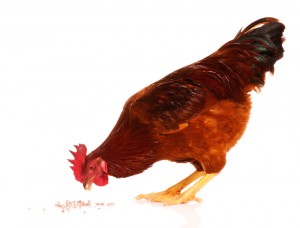Probiotics may reduce the level of Campylobacter bacteria in the digestive tracts of poultry and, by extension, the incidence of food poisoning in humans, according to a new study published in Zoonoses and Public Health.
 Campylobacter live in the intestines of many healthy animals including cattle, poultry and swine. During slaughter, these bacteria are often transferred to cuts used for meat or to whole poultry carcasses intended for sale as broilers, fryers or Thanksgiving dinner.
Campylobacter live in the intestines of many healthy animals including cattle, poultry and swine. During slaughter, these bacteria are often transferred to cuts used for meat or to whole poultry carcasses intended for sale as broilers, fryers or Thanksgiving dinner.
Campylobacter is a major cause of foodborne illness around the globe. In the U.S., campylobacteriosis, the infection caused by ingesting the bacteria, is estimated to sicken about 2.4 million people every year, according to the Centers for Disease Control and Prevention (CDC). And most of those cases are linked to eating under-cooked poultry.
Poultry intestines are coated with a layer of mucus which provides a habitat where Campylobacter thrive. The authors of this study wanted to know if interfering with the bacteria’s ability to adhere to the mucus could prevent them from colonizing.
They found that the probiotics Lactobacillus rhamnosus GG, Propionibacterium freudenreichii ssp. shermanii JS and a starter culture strain Lactococcus lactisssp. lactis all were able to reduce the prevent Campylobacter from colonizing. Future potential applications of the research would be to reduce foodborne illness in humans by giving probiotics to poultry.
It only takes a small number of Campylobacter organisms (fewer than 500) to cause illness in humans, according to the CDC. So, even at drastically reduced levels it would be important to use safe handling measures such as immediately cleaning up spilled juices, washing cutting boards and utensils that had contact with raw poultry before using them to prepare other foods and using a meat thermometer to make sure that poultry is cooked to an internal temperature of 165˚.




